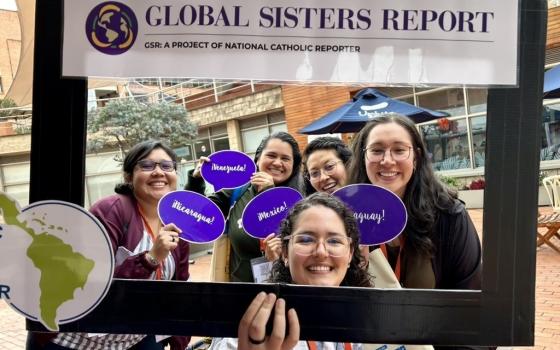RACE: A THEOLOGICAL ACCOUNT
By J. Kameron Carter
Published by Oxford University Press, $35
Is racism essentially religion-based? Does the theological construction underpinning the Christian worldview deem whiteness as foundational to creation? J. Kameron Carter argues yes.
He claims that the early Christians, through their attempt to break from their Jewish foundation, created a racialized understanding of themselves that is now fundamental to modern constructions of race. Jews became the "other," and Western Christian identity was created in contrast to that other. Jews became associated with the East, and Christian identity became synonymous with the West. Western civilization became identical to Christianity. The West, of course, was deemed superior, laying the groundwork for a Christian understanding of white supremacy. Carter's book first outlines the creation of this Western Christian white supremacist category of whiteness, and in the later parts of his book offers a constructive reimagination of Christian identity.
Towering over Carter's work is a larger theological debate about the manner in which theologians have constructed race. He stands in a long tradition of black scholars who challenge white Christians to take race seriously in their theological writings. Almost 10 years ago, James H. Cone, considered by many one of the fathers of black liberation theology, stood before the Catholic Theological Society of America and challenged white Catholic theologians on their silence surrounding racism in the United States. Carter expands that challenge, including his black colleagues in the fold. Race confronts theologians of all races; it is the first of its kind to study race as a theological category. Fundamental to Carter's argument is the insistence that to truly understand race in contemporary intellectual discourse and society at large, a theological analysis of race is necessary. Similarly, Carter argues, one cannot understand racism without taking the centrality of religion into serious consideration.
Prior to the publication of Carter's book, black theologians relied heavily on sociological and political constructions of race. In other words, race was not central to the nature of Christian identity. One's race was a perspective, both historical and contemporary, through which one approached Christian categories. Race appeared as something on the outside, a lens through which to approach Christianity, one that could be swapped for the lens of gender, sexuality, culture or class.
Carter takes an entirely different approach, arguing that not only is race a theological category, but that it has been since the first century. Theology, he argues, is part of the intellectual process of the construction of humanity as racialized. The creation of Christian identity evolved in such a manner that one's race became a marker of whether or not one was Christian. Christianity as a whole became aligned to Western Europe.
Carter's book offers a critical engagement of race theory in order to demonstrate that the category of race is religious in nature. Engaging the work of significant and complex scholars such as Cornel West, Immanuel Kant and Michel Foucault, Carter argues for an understanding of our humanity that is always shaped and defined by the category of race. This theoretical section requires patience and careful reading, but is well worth the effort. The second part of the book turns to the work of black scholars of religion, focusing on the contributions of Cone, Albert J. Raboteau and Charles H. Long. For the student of black intellectual history this is a critical section, for it provides an overview of black religious scholars' attempts to tackle the issue of race, and astutely points out their shortcomings. Carter provides a critical yet respectful treatment of his theological forefathers, ultimately demonstrating their failure to present race as a theological category.
The final section of the book offers a theological reading of three significant black historical figures: Briton Hammon, Frederick Douglass and Jarena Lee. Drawing from their understanding of Jesus, Carter builds a portrait of the Christian savior whose Jewish ethnicity cannot be ignored. This is a correction to the white European images of Jesus that saturate churches, Bibles and the imaginations of most Christians.
For Carter, reuniting Jesus to his Jewish body and identity undermines the white supremacist notion of Christianity as synonymous with Western European culture. Carter closes his text with an appeal to contemporary Christian theology to ground itself in the world of people of color. Those from the underside of modernity are the foundation of our reimagining a theological understanding of race and whiteness. In pushing us to redefine Jesus as Jewish, Carter encourages all of us to recast our understanding of the face of authentic Christianity. This is a book for readers interested in Christian theology, African-American studies and Christian history.
As someone who has followed Carter's career, I greatly anticipated this volume, and it definitely does not disappoint. This is a thoroughly researched and substantial text. In an era where academics are pushed to "publish or perish," it is refreshing to find such a thorough volume that clearly took a significant amount of time to research and write. Race is not an easy read. One is simultaneously impressed and humbled by Carter's breadth. For those not accustomed to academic theology, Carter's discourse may at times feel dense. However, it is well worth working through this book, for the complexity of its language is reflective of the complexity of the topic at hand.
Michelle Gonzalez is assistant professor of religious studies at the University of Miami. She is the author of Sor Juana: Beauty and Justice in the Americas (Orbis), Afro-Cuban Theology: Religion, Race, Culture, and Identity (University Press of Florida) and Created in God's Image: An Introduction to Feminist Theological Anthropology (Orbis).







